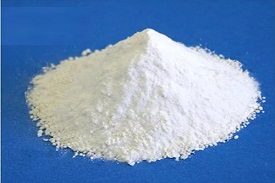
1,3-Phenylenediamine, abbreviated as 1,3-PDA, is a chemical compound belonging to the class of aromatic amines. It is commonly used as a raw material in the synthesis of various polymeric materials, such as polyurethanes, epoxy resins, and polyamides. This compound possesses two amino groups attached to a benzene ring, making it a versatile building block in organic synthesis. 1,3-Phenylenediamine finds applications in diverse industries, including the production of hair dyes, rubber chemicals, textile dyes, and pharmaceuticals. Due to its reactivity and ability to undergo condensation and polymerization reactions, 1,3-phenylenediamine plays a significant role in the manufacturing of high-performance materials with applications ranging from adhesives and coatings to biomedical devices. However, it is important to handle 1,3-phenylenediamine with care as it can be toxic and potentially hazardous if not used and stored properly, requiring adherence to safety protocols and regulations in industrial settings.
IS 1171:2011 is a pivotal standard for Ferromanganese, playing a vital role in ensuring the quality, safety, and reliability of this alloy in industrial applications. This standard provides comprehensive guidelines and specifications for manufacturers, covering essential aspects such as chemical composition, physical properties, and manufacturing processes. By setting clear parameters for factors like manganese content, carbon content, and impurity levels, IS 1171:2011 ensures that Ferromanganese meets stringent standards for consistency and suitability in metallurgical processes. Compliance with this standard not only fosters confidence among consumers but also enhances the efficiency and reliability of Ferromanganese in diverse industrial applications, including steelmaking, foundry operations, and alloy production. This standard fosters innovation and technological advancement in Ferromanganese production by providing a reliable framework for quality assurance and continuous improvement.
Note: Obtaining the ISI/BIS Certification is a mandatory requirement for manufacturers of 1,3 Phenylenediamine to sell their products in the Indian market.
In India, manufacturers are obligated to obtain the necessary ISI/BIS certification for their 1,3 Phenylenediamine products to market and sell them legally within the country. This certification is essential as it ensures compliance with specific quality and safety standards mandated by the BIS for the production and distribution of 1,3 Phenylenediamine. Without the ISI/BIS certification, manufacturers risk facing legal repercussions and challenges in accessing the Indian market. Obtaining this certification is crucial for manufacturers to demonstrate the reliability, compliance, and quality of their 1,3 Phenylenediamine products. This certification process underscores the importance of ensuring the integrity and safety of 1,3 Phenylenediamine, thereby instilling confidence among stakeholders in the chemical industry regarding its suitability and adherence to Indian standards for usage and distribution.
Indian Standards Institute, or ISI was renamed the Bureau of Indian Standards (BIS) in 1987. The official mark that the Bureau of Indian Standards provides for manufacturers of various goods is the ISI Mark. It is used to indicate compliance with Indian standards (IS) set by the Bureau of Indian Standards (BIS) and has been used as a conformity marking for industrial products. Manufacturers received permission from BIS to use the ISI Mark on items that comply with relevant Indian requirements through the product certification program.
Only manufacturers (domestic or foreign) who produce the finished product will be awarded ISI Certification. This will not be given to any product importers, traders, dealers, or distributors.
The following documentation is required to get an ISI certification:
For more detailed information, please click here.
There are two approaches for Indian manufacturers to become certified with the ISI Mark:
Regular Procedure
With the possible exception of cases deemed "All India first," which might take up to 180 days, the licensing procedure is expected to be finished in 120 days. This timeline starts on the day the application is received, assuming that at different points in time the documentation, unit assessment, and product conformance are all deemed acceptable.
Step 1: Manufacturing Unit Customization in Compliance with Applicable Indian Standards
Step 2: Submission of the Application Form
For more detailed information, please click here.
Simplified Procedure
This is a much faster process than the standard procedure. After a factory inspection is deemed satisfactory and the initial evaluation establishes that the sample complies with the applicable Indian Standard(s), the license application process is expected to be finished in 30 days.
Step 1: Adapting the Manufacturing Unit to Comply with the Relevant Indian Standard
Step 2: Sample Testing
For more detailed information, please click here
The process of obtaining ISI Mark Certification for Foreign Manufacturers typically includes the following steps:
Step 1: Application
Step 2: Query Raised (If Any)
For more detailed information, please click here.
Brand Liaison provides helpful support for achieving ISI Mark Certification. Among our offerings are:
Please click here to get in contact with our team of specialists for a deeper explanation of the paperwork and steps needed to get ISI Mark Certification.